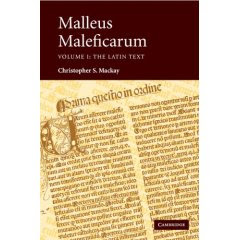 The April issue of Rue Morgue magazine caught my eye at the newsstand recently with an article titled “The Witch Hunter’s Bible,” an article that explored the infamous Malleus Maleficarum. For those unfamiliar with this document, it comes from the medieval period (perhaps the 15th century) as a Christian manual that purports to provide the tools necessary to identify, describe, and proesecute what was labeled as Witchcraft. The Malleus includes three sections, the first identifying witchcraft and connecting it to the Devil and Satanism, the second presenting alleged case studies and evidences related to witches, and the third constituting recommendations on appropriate ways to prosecute them.
The April issue of Rue Morgue magazine caught my eye at the newsstand recently with an article titled “The Witch Hunter’s Bible,” an article that explored the infamous Malleus Maleficarum. For those unfamiliar with this document, it comes from the medieval period (perhaps the 15th century) as a Christian manual that purports to provide the tools necessary to identify, describe, and proesecute what was labeled as Witchcraft. The Malleus includes three sections, the first identifying witchcraft and connecting it to the Devil and Satanism, the second presenting alleged case studies and evidences related to witches, and the third constituting recommendations on appropriate ways to prosecute them.
The Rue Morgue article notes that the Malleus had “fallen into relative obscurity” until Augustus Montague Summers, an Anglican clergyman, translated and reprinted the document in 1928. This translation has been called into question, and Cambridge University Press has recently published a new and extended two-volume translation with commentary by professor Christopher Mackay.
The article on the Malleus stood out because I recognize that this was an important document in history as it informed Christendom as to its stereotypes of Witchcraft, and helped fuel the dreadful witch crazes and persecutions of the past. I’m not sure why an article on this topic appeared in a magazine that addresses horror in culture and entertainment, although it is not much of a stretch to consider the witch trials and burning times as real-world horrors. A clue to why this article may have been included in the magazine is given later as Mackay comments on the continuing legacy of the Malleus as he recalls the twentieth century’s witch, occult, and satanic panics. I might have taken this article a step further and helped make it more directly relevant to the magazine’s content. It has dawned on me as I reflect on horror films and their depiction of Witchcraft and the occult as to whether this genre of entertainment does not represent yet another area impacted by the legacy of the Malleus and the development of folk and pop culture stereotypes.





Very interesting indeed.
The Malleus maleficarum certainly influenced the early modern perceptions of witchcraft and satanism, which in turn influenced the pop culture perception. I think authors like Dennis Wheatley were incluenced by Montague Summers, whose thinking is reflected in novels like The devil rides out, which I recently found reprinted, and reread to see if the impression it made on me now was different from when I read it as a school boy. I found I was less disappointed with it than I was with Huxley’s Brave new world after a similar interval, and found it surprisingly good, apart from the Deus ex machina waking up and finding that part of it was all a dream.
What concerns me more, however, is that is seems that just as the attitude to witchcraft changed in Europe on the cusp of modernity, resulting in the Great Witch Hunt, something similar seems to be happening in Africa with modernisation.
I recently blogged about it at Witchcraft — African and European, and would appreciate your comments on that aspect of it, if you have any.